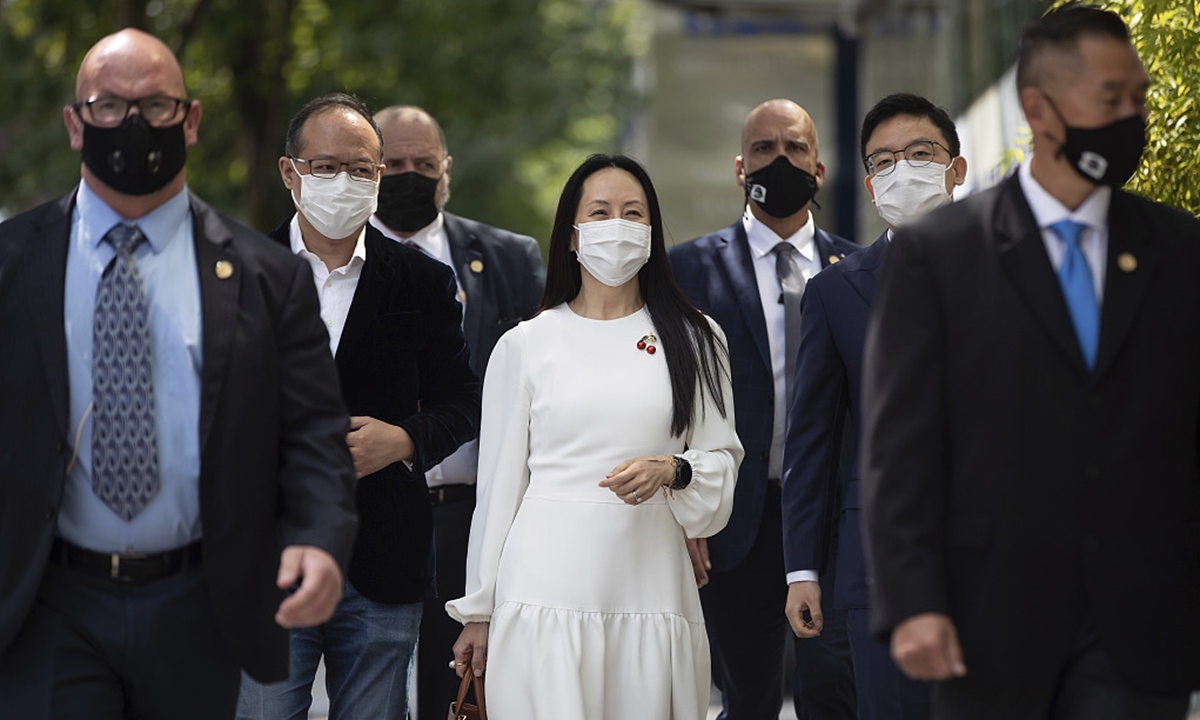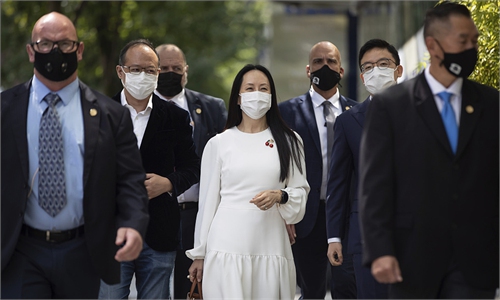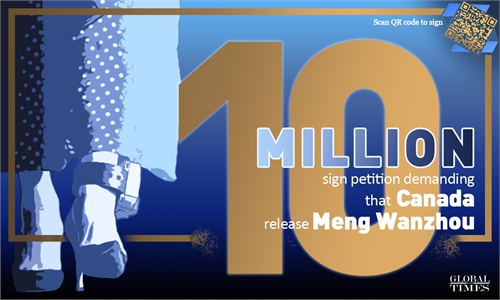1,000 days on, detention of Meng Wanzhou overshadows China-Canada ties
Canadian politicians, media intentionally shun public call of over 14 million for Meng's release: experts

Meng Wanzhou Photo: VCG
Click here to cast your vote for the release of Meng WanzhouAs August 26 marks the 1,000th day since Chinese citizen Meng Wanzhou was arbitrarily and illegally detained by Canadian government at the request of the US government, Chinese diplomats and experts once again urged the Trudeau administration to quickly correct its mistake of serving as Washington's willing accomplice that has dragged China-Canada relations to freezing point and cast a shadow over future prospects not only in politics but also in trade and business.
Over the past week, more than 14.5 million netizens from over 100 countries and regions including major allies of the US such as the UK, Australia and Canada, signed a petition launched by the Global Times on August 18 and an open letter sent to Canadian Ambassador to China Dominic Barton, demanding Meng's immediate and unconditional release and protesting against the ugly acts of the Canadian government. The Global Times also sent the petition and open letter to the Canadian Embassy in Beijing by both mail and email on Thursday.
Chinese Ambassador to Canada Cong Peiwu called Meng on Wednesday to express his sympathy and denounce the misdeeds of the Canadian government, hoping that she will take care of herself and uphold the faith.
The Chinese envoy also condemned the Canadian government's wrongdoing, emphasizing that any attempt and conduct of bullying or suppressing the Chinese people would be met with a counterstrike, adding that the Chinese government firmly protects the legitimate rights of Chinese citizens and companies.
Though the petition has collected nearly 15 million signatures in China and around the world, reflecting a strong voice in opposing such unfair treatment of the Chinese citizen in Canada, most Canadian media outlets and politicians gave little reaction to this collective will, which is unsurprising in the eyes of Chinese observers, as the incident has become a political hot potato for the administration of Canadian prime minister Justin Trudeau.
Also, given the growing dissatisfaction of the Canadian public toward the role the Canadian government has been playing in the detention of Meng, which according to some Canadian media and analysis led to the unknown fate of Canadian citizens Michael Spavor and Michael Kovrig, the Trudeau administration has been deliberately downplaying Meng's case to avoid being entangled in the political dilemma ahead of the upcoming election, some observers said.
Questions to be answered
Wang Wenbin, spokesperson of the Chinese Foreign Ministry, asked at a routine press conference on Thursday, "Does Canada still know right from wrong? Where are the human rights it claims to defend?" after the country ignored the fact that Meng did not violate any law in Canada but unreasonably and arbitrarily detained her for 1,000 days.
These are questions not only from the Chinese government, but also from the public that need to be answered by the Canadian government. Even during the latest proceedings, Canadian judges repeatedly raised questions and points of suspicion over accusations of fraud made by the US against Meng, saying that the accusations were contradictory and unclear, further exposing the inconsistencies of the Canadian side that has failed to justify its actions.
At the request of the US government, the Canadian government, based on so-called accusations of fraud levelled by the US, on December 1, 2018 illegally detained Meng, who is also the daughter of Ren Zhengfei, founder of Huawei.
She was accused of defrauding HSBC as she was said to have "lied to the bank about the Chinese company's business in Iran". The charges centered on a PowerPoint presentation that the CFO gave to the bank in a steakhouse in Hong Kong in 2013. However, her lawyers have claimed that the US deliberately omitted two slides from the PowerPoint presentation that showed Meng did not mislead the bank at all.
Obviously, Canadian politicians turned a blind eye to such a strong call in releasing Meng because they are now focusing on the election, and they will only pay much attention to topics that can play a favorable role in attracting votes, Li Haidong, a professor at the Institute of International Relations at China Foreign Affairs University, told the Global Times on Thursday.
"Also, they may consider that as China has yet to respond to their requests over the ruling of Canadian citizens in China, they won't respond to China's request. But the root cause lies on the Canadian side," Li said.
When asked about the recent trial of Michael Spavor, Wang from the foreign ministry reiterated on Thursday that China has expressed its stance on the case many times. China is a country ruled by law, handling cases independently in accordance with the law and ensuring the legitimate rights of Canadian citizens.
Observers of the Chinese-Canadian relationship also noted that many Canadian people are unhappy with the way the Trudeau administration has handled the Meng case, which has only brought trouble to Canada. Also, some believe that Canada should not embroil itself in the geopolitical wrestling between the US and China. In addition, Conservatives, as the major foe of the Trudeau government, have been attacking the Prime Minister over the handling of Meng's case, which all explained why Canadian politicians and media are trying to downplay the matter.

In this prolonged struggle among three world powers --Canada, US and China--Canada will be the biggest loser, an expert warned, as if it hands MengWanzhou over to US, it will create a serious negative impact to its relations with China. Editor: Shi Yue/GT Graphic: Feng Qingyin/GT
'Sword' over bilateral trade
The souring bilateral relationship has also disrupted the once stable trade relations between the two countries, and some businesspeople have been looking for a "plan B" over the past two years to diversify their import sources as they are afraid a "black swan" event could happen at any time.
"Canola imports from Canada are already much smaller compared with two years ago," Jiao Shanwei, editor-in-chief of grain news website cngrain.com, a close watcher of China's agriculture industry, told the Global Times on Thursday.
China has never cut Canola trade ties with Canada, but you can see imports from other regions such as South America and Europe have already filled the gap it left, Jiao added.
Canola is Canada's second-largest export and its top agricultural export to China.
China banned two Canadian rapeseed exporters - Viterra Inc and Canadian farming company Richardson International - in March 2019, after its customs authorities detected certain pests such as leptosphaeria maculans.
After the block, seed exports to China fell from $2.8 billion in 2018 before the restrictions, to $800 million in 2019 and $1.4 billion in 2020. This cost the industry between $1.54 billion and $2.35 billion in lost sales and lower prices between March 2019 and August 2020, according to data from Canola Council of Canada.
Domestic lumber importers are also sharing the same concerns.
A staff member of Huan Mai Wood, a Chinese wood import company that has bases in East China's Jiangsu Province and South China's Guangdong Province, told the Global Times on Thursday that the company's lumber imports from Canada have been declining over the past years, and the US has already taken up the space left by Canada.
The staff member, who preferred to remain anonymous, did not reveal the exact amount of the decline, while adding that the import source shift has had no impact on the company's business.
Meanwhile, some other products from Canada, such as meat and other farm products, are still running as usual with no obvious fluctuations, Jiao said.
"Imports of Canadian seafood are normal, and some species have also seen increases," Fan Xubing, president of Beijing Seabridge Marketing, a cold-chain food importer, told the Global Times on Thursday.
Nevertheless, industry players pointed out that Meng's detention is like a sword hanging over the economic relationship between the two sides, and only after the case is properly handled can the two sides' trade go back on track at an early stage, or else lose momentum forever.
China is also better-placed in any trade dispute with Canada, they added.
In the first half of 2021, total trade between Canada and China reached 53.71 billion Canadian dollars ($42.61 billion), a year-on-year increase of 19.9 percent, accounting for 9.1 percent of Canada's total foreign trade.
China is also Canada's second largest trading partner, second-largest source of imports, and second-largest export market, all second to the US.





